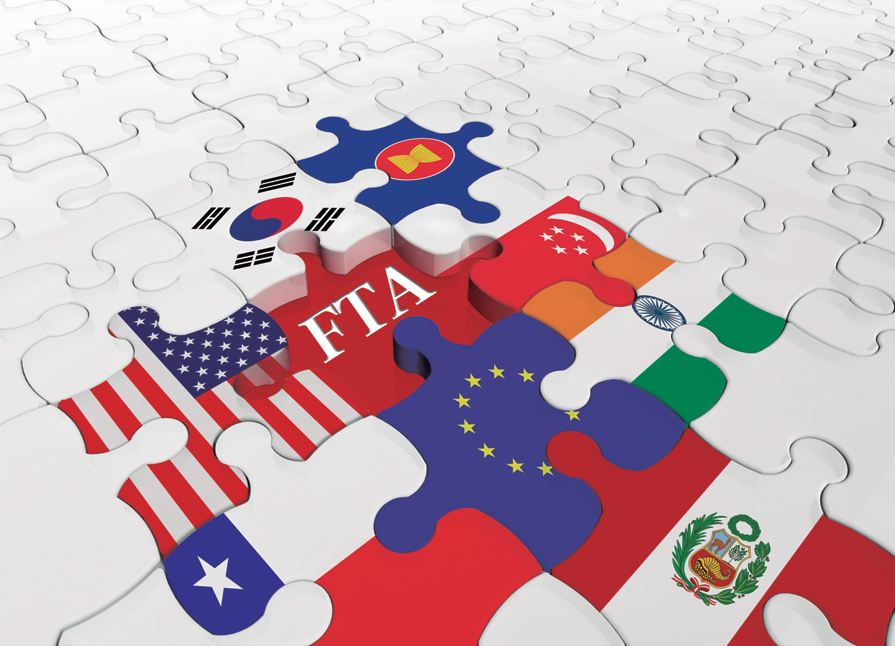Trump’s trade approach diverges sharply from free trade Republicans
Wednesday, November 15,2017
AsemconnectVietnam - President Trump’s isolationist approach to trade is rattling what little uneasy peace remains within the Republican Party as the White House pursues policies at odds with longstanding conservative orthodoxy about the benefits of free and open markets.
Republicans have long championed free trade, believing that by allowing markets to operate unhindered, nations can boost domestic industries, lift their wages and improve living standards. That view is not shared by Mr. Trump, who has taken a much more critical approach to trade, sowing concern among many Republicans and business groups that the United States will wind up on the losing end of an integrated global economy.
The divergence was on display last week, with Mr. Trump proclaiming during a trip to Asia that the United States will no longer enter into the type of multination trade agreements that America has long led the world in creating.
“I will make bilateral trade agreements with any Indo-Pacific nation that wants to be our partner and that will abide by the principles of fair and reciprocal trade,” the president said in Vietnam on Nov. 10. “What we will no longer do is enter into large agreements that tie our hands, surrender our sovereignty and make meaningful enforcement practically impossible.”
In a speech at the White House on Wednesday, the president recounted the warning he had given to other leaders as he traveled across Asia about exploiting America’s open trading system for their economic gain. He proclaimed that his tougher approach to trade had begun to take effect, and that nations around the world have renewed respect for the United States.
“The days of the United States being taken advantage of are over,” Mr. Trump said.
But despite the president’s declarations of progress and his promises to make one-on-one deals, he appeared to have returned from the trip empty-handed, without any new trade deals in process. At the same time, several of the nations he visited announced they were moving forward with the Trans-Pacific Partnership, an 11-country trade deal that had support from Republicans but which Mr. Trump jettisoned during his first days in office.
Republicans and business groups are now warily eyeing talks over the North American Free Trade Agreement, which resume again this week against the backdrop of Mr. Trump’s get-tough talk. Mr. Trump has already repeatedly threatened to withdraw from Nafta if Canada and Mexico don’t accede to the United States’ demands. The White House could soon be forced to decide whether to accept minor changes to the accord in a face-saving gesture or withdraw entirely, since neither Canada nor Mexico shows signs of bending.
Canadian and Mexican negotiators believe that renegotiating the pact to more heavily favor the United States would cost them politically at home — and that, even if they agreed to Mr. Trump’s demands, the United States Congress would not approve them.
The fissures over trade are a product of a surge in populism on both the political right and left.
Growing anxieties about the unforeseen costs of globalization, the overhang of the financial crisis and the stagnation of the middle class have deeply damaged voters’ faith in the ability of free markets to deliver prosperity — and fractured the Republican Party in the process. Conservative populism is in ascendance, while free market Republicans have been left increasingly marginalized.
According to a new poll by the Pew Research Center, Republicans are now more likely than Democrats to say that Nafta is bad for the United States. The opinion of Republicans toward free trade has worsened sharply since the George W. Bush administration, when the party was more likely than Democrats to describe trade, in general, as a good thing.
In a recent interview with The New York Times, Stephen K. Bannon, the former White House strategist who has declared war on the Republican establishment, mocked the party’s views on trade.
“Yeah, we’re free traders, yeah, they passed a free trade deal,” Mr. Bannon said. “It’s not even questioned, O.K.? It was Holy Writ, never questioned. And in that, I said, ‘No, this is what’s destroyed the country.’”
While free trade has been broadly beneficial to the United States, politicians and business leaders in past decades oversold its potential to benefit all, said Stefan Selig, a former trade official in the Obama administration.
The benefit to the average American of being able to buy cheaper products was no match for the concentrated damage that global trade — in addition to forces like automation — has wrought in some American communities. Workers have suffered job losses across the United States as mills, factories and manufacturing plants either shuttered their doors completely or moved production overseas.
“That is not a political cocktail that is a good one, especially in primary seasons,” said Mr. Selig.
Mr. Trump appealed to voters by advocating a heavier hand to prevent further damage from trade, including erecting tariffs on foreign products and renegotiating trade pacts. In a tweet on Tuesday, the president described trade deals negotiated by past administrations as “horror shows.”
In a sign of how far this political realignment has gone, the business community, a traditional ally of the Republican Party, is protesting the president’s plans to rewrite Nafta, while labor unions, a stalwart of the left, are cautiously supporting it.
Business leaders argue there is an ideological inconsistency between the administration’s plans to cut and simplify taxes and regulation — and its measure on trade, which essentially would increase both.
Matt Blunt, the former Republican governor of Missouri and the president of the American Automotive Policy Council, which represents Ford, General Motors and Fiat-Chrysler, said the administration’s proposal for the auto industry under Nafta would encourage more companies to pay a tariff to import their goods, essentially creating a new tax on the industry.
Mr. Blunt said the proposals “would seem to be counterproductive to the goals and aspirations of the Trump administration, which has talked about how they can help industry be competitive through regulatory reform and hopefully a tax cut, not a massive tax increase.”
Lance Fritz, the president and C.E.O. of Union Pacific Railroad, said pulling out of Nafta would harm trade, which would in turn weigh on his business. “Tariffs are taxes and empirically and theoretically, the more you tax something, the less you get of it,” he said.
Some Republicans, including those from farming and border-states, have protested the president’s threats to withdraw from Nafta, arguing its loss would deeply harm their constituents.
But the response from other quarters — including congressional leadership — has been surprisingly muted, given how deeply the president’s actions contradict the Republican Party’s longstanding faith in freer trade.
“It’s just one more item to oppose the White House on and a lot of people are not willing to do that,” said Senator Jeff Flake, Republican of Arizona. Mr. Flake, an outspoken critic of the president.
“I’m really worried about where we are headed,” Mr. Flake said.
Trade advisers say congressional leaders are pressing the United States trade representative, who handles the negotiations, behind the scenes. But most have not been willing to create an open rift with the president on trade that could put at risk their current efforts of reforming taxes, said Phil Levy, a senior economist for trade during the Bush administration.
“There is little enthusiasm among congressional Republicans for open conflict, but that doesn’t make the tensions go away,” Mr. Levy said.
Source: nytimes.com
Standard Chartered, US promote clean energy investments in Vietnam
Vietnam, Russia’s Zabaikal region enhance cooperation
Hai Phong Techfest connects Vietnamese, RoK businesses
Made-in-Vietnam wind turbine towers bound for RoK
Vietnam-Laos-Cambodia-Thailand trade fair opens in Laos
NA Chairman meets with executives of large Chinese groups
Vietnam, Laos sign new trade agreement
French businesses interested in Vietnamese market
Vietnam, Russia discuss stronger agriculture cooperation
Vietnam, Indonesia similarities facilitate trade, agro-fishery cooperation
Vietnam, Japan promote financial mechanisms in green energy transition projects
Vietnam Connect Forum 2024 to take place in Hai Phong next month
Vietnam, Canada look to boost trade cooperation
Binh Duong province seeks cooperation opportunities with Australian partners

Plan of Hai Duong province for a period of 2021 - 2030, ...
Organize space reasonably and harmoniously, focusing on connecting Hai Duong in common development space, actively contributing to the ...Plan of Hau Giang province in a period of 2021 - 2030, ...
Sustainable forestry development program in a period of ...

12th-century ancient road unearthed at My Son Sanctuary
An ancient road dating back to the 12th century has freshly been discovered in an excavation on architectural ruins at the east side of ...Efforts made to seek UNESCO’s recognition for Con Moong ...
Vietnam Art Photo Contest and Exhibition 2024 to be held ...
Bas-relief featuring talks between Uncle Ho and soldiers ...



